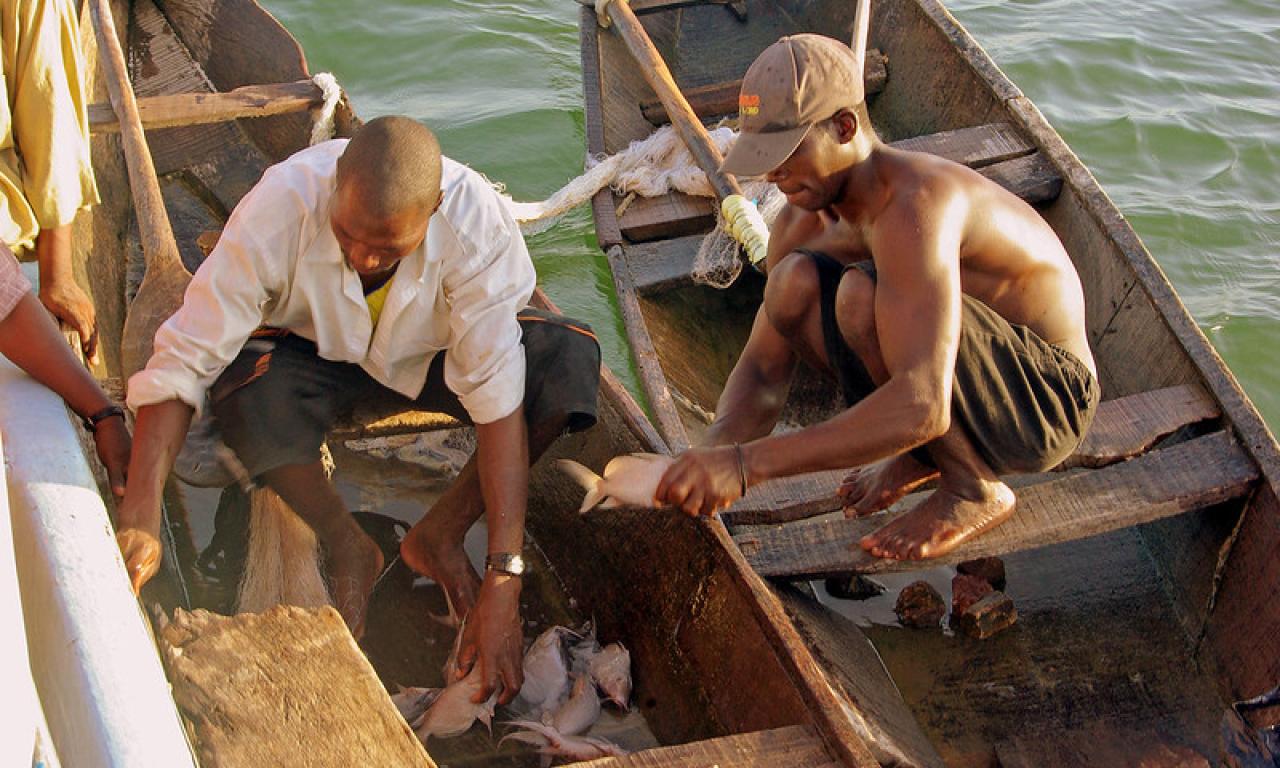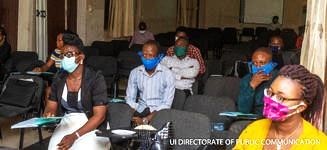
By the Improving Biosecurity project team
The COVID-19 pandemic and associated restrictions came into full force just as the Feed the Future Innovation Lab for Fish project on “Improving Biosecurity: A Science-Based Approach to Manage Fish Disease Risks and Increase the Socioeconomic Contribution of the Nigerian Catfish and Tilapia Industries” was getting off the ground. Creating a mobile-phone-accessible course during the long-term COVID-19 restrictions was an ingenious way for the research team to train enumerators and postgraduate students under lockdown conditions.

This was key to ensuring successful training delivery as most participants had restricted access to shared training facilities, such as a seminar room and face-to-face tutoring. Many had to work from home. Mobile phones were, therefore, the most logical option for training courses because these were the most familiar devices for participants to access the course. Mobile phones also enabled participants to start and stop the course at their convenience, and they were portable enough to be used anywhere and at any time.
The development of the mobile phone online course additionally provides opportunities for all stakeholders who own a mobile device regardless of gender and age to benefit from the training content in the future.
Following the mobile device training, participants received training through a three-day online/in-person hybrid workshop to train enumerators and postgraduate students in data collection and the use of survey tools for a study on epidemiology and health economics of catfish and tilapia aquaculture. The hybrid training approach was used to facilitate capacity building while ensuring safety of participants. The mobile device training was conducted using education technology platform Learn.ink, open-source data collection platform KoBo Toolbox, and the Open Data Kit (ODK) Collect mobile application. The three-day training was supported by videoconferencing platform Microsoft Teams and utilized our epidemiology survey tool. In addition, small, in-person groups were employed to deliver training sessions on practical fish sampling for disease diagnostics.
The training program focused on building capacity of participants by familiarizing them with the necessary digital tools to collect and compile information from remote locations with limited internet accessibility. These skills and tools will continue to be useful to participants who will communicate with remote farm communities through these programs even after the COVID-19 pandemic is brought under control.
“While the three-day virtual event aided a comprehensive understanding of the processes, tasks, and theories involved with the epidemiology and health economics survey and fish sampling, the online ODK course developed on Learn.ink that we took before the virtual event helped convey the ideas in a very simple way with the pictures and quizzes, which were easily recalled during the fieldwork,” said Oyebade Timileyin, an enumerator who was previously a farm veterinary doctor and contract officer with the Ministry of Health.
“Altogether, every unit of the training and tools helped in unique ways to get the job done and will be instrumental for future research projects.”
The ODK course was developed on Learn.Ink, which is a training platform designed for remote delivery of courses on mobile devices. The ODK Collect mobile app, which could be used to save survey data offline on mobile devices for later upload at internet connection points, was the tool of choice for farm surveys. Since this required a proper understanding of general server settings, loading updated survey forms, and saving the data, delivery of the ODK course was prioritized in the timeline before the 3-day virtual training event to familiarize participants with the mobile app and survey tool.
For assessment purposes, users were required to complete short quizzes, comprising random selection and sequence of preset questions in order to proceed to the next stage of training in every module. To understand if the course had the intended impact, user information and course accuracy in aggregate and individual questions were observed in real-time analytics on the platform, allowing the event organizers to focus on concepts with lower accuracy scores during online discussions held within the virtual training. Support throughout the course was provided via email to users with inquiries or feedback.
“The email support given throughout the ODK course was very helpful, self-explanatory, and was just the needed guide to go through the course effortlessly,” said Faroyin Omolola, an enumerator and research assistant with the University of Ibadan. “Using a mock survey submission on the ODK Collect mobile application helped prepare me for the actual survey, and it was easy to use. Having gone through the Learn.Ink ODK course, mock surveys, and the 3-day virtual training event, I can confidently use these tools for future epidemiological investigations. It was such a privilege.”
To keep participants engaged during the 3-day virtual training while complying with COVID-19 restrictions, selected participants gathered at the Centre for Sustainable Development (CESDEV) facility for shared use of audio and video equipment with socially distanced seating arrangements. The selected in-person participants were enumerators and master’s students while other colleagues joined the training online from their locations. The participants of both the online ODK course and the 3-day virtual training event included 12 enumerators, four graduate students, and three staff from the University of Ibadan. They were comprised of 11 males and eight females, with seven participants under the age of 30 and the remainder aged 30 and above.
“The COVID-19 pandemic was not really a challenge as protocols were followed to prevent contracting the disease,” said Adedamilola Oyesola, an enumerator with prior veterinary experience working with farms. “My future plan is to use the knowledge gained in the training to solve other challenges relating to zoonotic disease outbreaks and antibiotic resistance that are major global public health concerns.”
The mobile accessible course will be continuously available as an online resource for farmers, veterinarians, service providers, extension workers, and others, serving as an interface for online interaction between stakeholders after the project ends. The hybrid training approach serves as part of the formal and informal education of participants, addressing the capacity development gap by providing much-needed access to online training material to farm communities in multiple remote locations within Ogun and Delta States.
Familiarization with the training platform will pave the way for achieving the project objectives, including providing training for field sample collection and distribution of digital better management practices. The same platform will also be used to help participants become part of an established process for consistent reporting of disease PROJECT TEAM Lead Mohan Chadag, PhD PI WorldFish Lead Rohana Subasinghe, PhD Co-PIs WorldFish Jerome Delamare-Deboutteville, PhD WorldFish Nigeria Olanike K. Adeyemo, DVM, PhD PI University of Ibadan Nigeria Oluwasanmi O. Aina, DVM, PhD Co-PI University of Ibadan U.S. PI Larry Hanson, PhD Mississippi State University U.S. Robert Wills, PhD Co-PI Mississippi State University This story was made possible by the generous support of the American people through the U.S. Agency for International Development (USAID) under the Feed the Future initiative. The contents are the responsibility of the Feed the Future Innovation Lab for Fish and do not necessarily reflect the views of USAID or the United States Government. incidents and participate in a sampling network for diagnostics and implementation of improved management practices. Farmers will also be encouraged to report disease by referring to future disease-monitoring courses to be developed on the platform.
Providing farmers and other stakeholders with these skills and resources is a key step in improving biosecurity in the Nigerian aquaculture sector, ultimately contributing to better livelihoods for producers and improved food security and nutrition for consumers.
Resources
End user guidelines: How to access digital surveys for aquaculture using ODK Collect mobile app and KoboToolbox (https://hdl.handle.net/20.500.12348/4893)
End user guidelines: How to sign up and access the course on aquaculture survey with ODK on Learn.ink (https://hdl.handle.net/20.500.12348/4894)
Content creator guidelines: How to manage digital surveys for aquaculture using KoBoToolbox and ODK Collect mobile app (https://hdl.handle.net/20.500.12348/4892)
ABOUT THE FISH INNOVATION LAB
The Fish Innovation Lab supports the United States Agency for International Development’s agricultural research and capacity building work under Feed the Future, the U.S. Government’s global hunger and food security initiative.
Mississippi State University is the program’s management entity. The University of Rhode Island, Texas State University, Washington University in St. Louis, and RTI International serve as management partners.